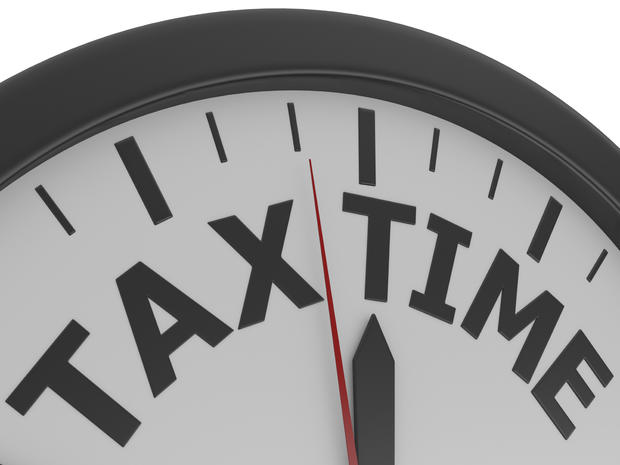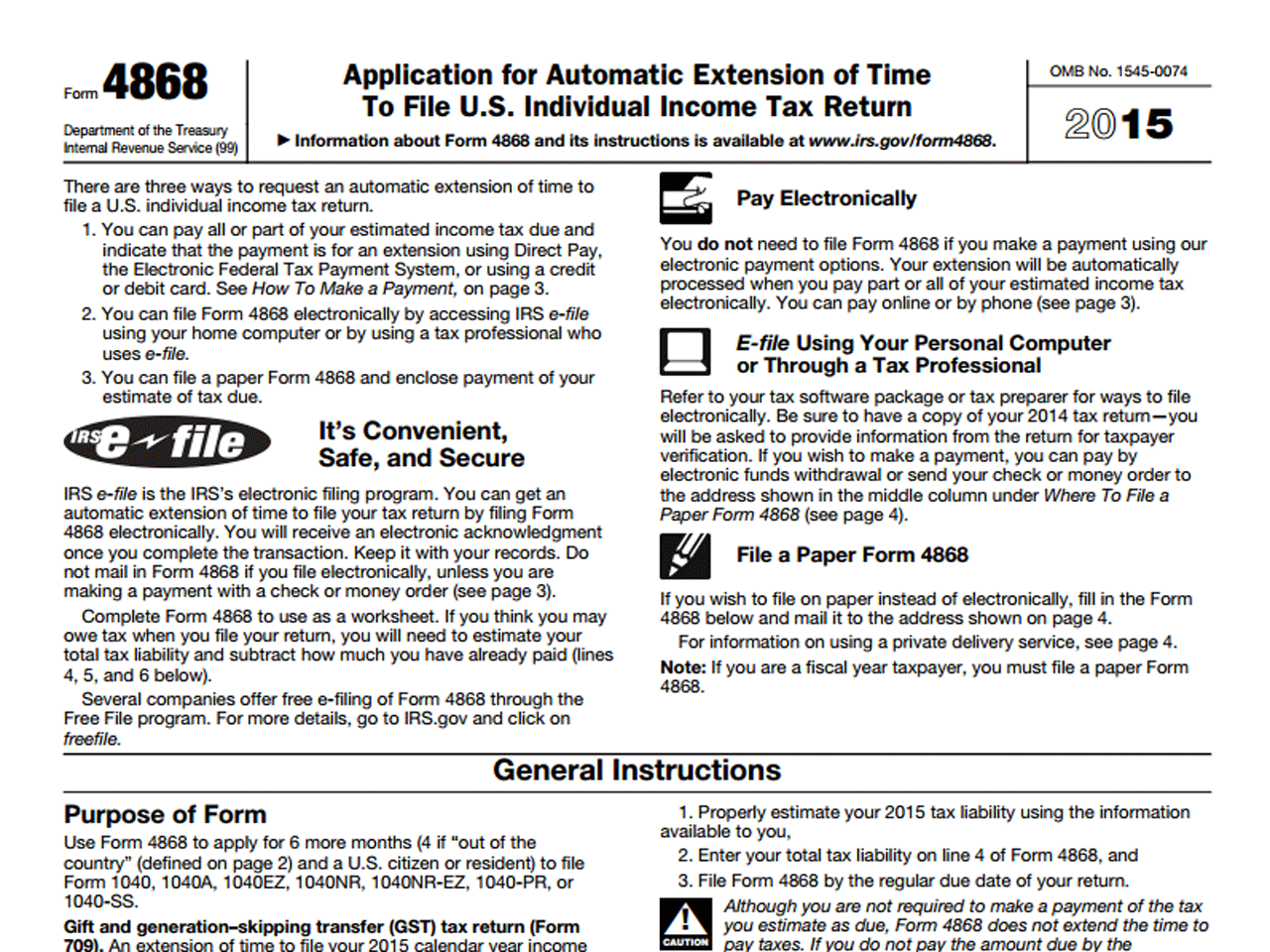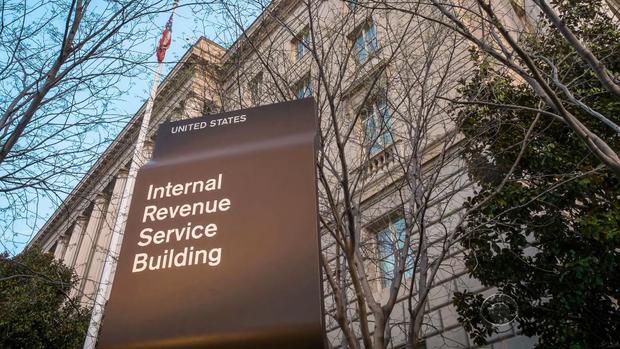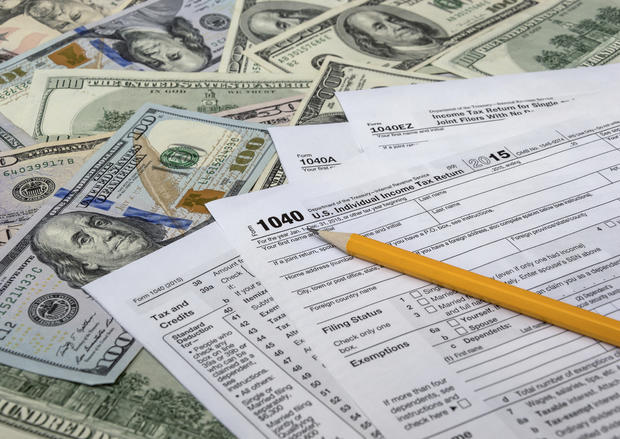How to file a tax extension with the IRS in 2016
By Nicholas Pell/GOBankingRates
With the tax-filing deadline quickly approaching, there isn't much time left for you to complete your forms and get your taxes filed. However, if you can't file by April 18, you're in luck -- there is a way to get more time to e-file taxes or send them in after the regular due date. A tax extension is frequently granted by the IRS when people need a little more time to get their information together.
Even though it's a common situation for a taxpayer to need a tax extension, few people know the specifics for requesting one.
Here are the rules you'll need to know and follow to correctly submit your IRS tax extension request.
This article was originally published by GOBankingRates.
How to file a tax extension
Whether you file taxes online or file tax return forms via mail, the general process to request an extension on the tax deadline is the same. The tax extension deadline is the regular tax deadline. To qualify for a tax extension, you must file the appropriate form by the standard tax filing deadline of April 18, 2016 (or April 19, 2016, if you live in Maine or Massachusetts). You can file a tax extension online or via mail by following these steps:
- Get and fill out IRS extension Form 4868, Application for Automatic Extension of Time To File U.S. Individual Income Tax Return.
- Mail your completed form to the IRS or file the form electronically by using an IRS e-file form.
- Once you've filed your completed IRS tax extension form, you'll automatically get the six-month extension to file your IRS tax return.
You can even get the automatic extension without filing IRS Form 4868. To do this, pay all or part of your estimated income taxes that are due. You must provide relevant tax information and indicate that the payment is for a tax-filing extension using one of the IRS-approved methods of payment. You will then receive a confirmation number for your records.
Automatic tax extension: How to know if you qualify
Most taxpayers can qualify for the general automatic tax extension from the Internal Revenue Service if they can't file their tax returns by the due date. The automatic income tax extension allows you six more months to submit your federal tax forms.
Six months is generally the longest amount of time allowed for an extension for filing taxes, though there are certain exemptions to this general rule. Note that a federal tax extension does not mean that the deadline to submit your state taxes is extended; each state has its own requirements for filing an extension.
Special tax extensions
Some tax filers will qualify for an automatic two-month extension to file their federal tax return and pay income tax. To qualify, you must be a U.S. citizen or resident alien and on April 18, 2016, you must:
- Be living outside the U.S. and Puerto Rico and your main place of business or post of duty must be outside the U.S. and Puerto Rico
- Be in military or naval service on duty outside the U.S. and Puerto Rico
More detailed, special IRS rules exist for two groups of people that are automatically allowed special IRS tax filing extensions:
- Americans living outside the U.S.
- American servicemen and civilians serving in a combat zone or a qualified hazardous duty area
For those two groups, the extended deadlines depend on the classification of the taxpayer's situation, but are generally longer than the automatic six-month extension most Americans can request. Special tax filers must ensure their federal and state tax returns are in before their extensions expire.
Who doesn’t qualify for a tax deadline extension?
Some taxpayers will not qualify to file extensions of any kind. People who are under court order to pay by the regular due date will not be granted more time to pay or file their taxes. Also, if you want the IRS to figure out the taxes you owe or that will be refunded, you will not qualify for the six-month extension.
You can find more information at IRS.gov or by calling the IRS tax help line number at 800-829-1040.
Penalties for late filing
Even if you file an extension, you will have to pay penalties if you do not pay your taxes by the regular tax due date. Filing a tax extension keeps you square with the IRS and lets them know that you will be filing your complete paperwork later, but it does not grant you more time to pay the taxes you owe. If you might be subject to a penalty, keep the following in mind:
- The penalty for paying late is 5 percent for every month that the outstanding tax is not paid.
- The maximum penalty for paying late is 25 percent of the total.
- The minimum penalty is $135 or 100 percent of the balance due, whichever is smaller.
If you are going to pay your taxes late, you can avoid a penalty if you can show the IRS that you have a reasonable cause for not paying your taxes on time. If you believe that you have reasonable cause, attach a form explaining your reasons to your federal tax extension form. Note that you might have to pay interest on unpaid taxes. Currently, this rate is about 3 percent annually.
Much like the late payment penalty, you can avoid the minimum penalty by showing the IRS that you have a reasonable cause for filing after the due date. Attach a statement to your form with an explanation about why you filed taxes after the due date to apply for this extension. You do not have to, nor should you, include the tax extension form.
The interest on your late taxes will accumulate as tax debt until you pay the IRS in full. So although an extended deadline might sound good, it's wise to file for a tax extension only if absolutely necessary.





